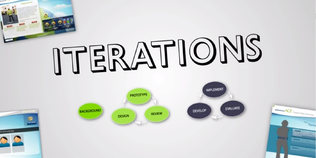Blog
Good e-Learning Design Begins with Asking "Why Not?"
by Richard Sites, vice president of client services | @rhillsites


A Purposeful Change to Your e-Learning Projects
By Richard Sites | July 31, 2012 | Custom Learning | 0 Comments
 by Richard Sites, vice president of client services | @rhillsites
by Richard Sites, vice president of client services | @rhillsites
Sometimes when I sit down to write a blog post, it is pretty straightforward: I have something specific I want to write about and it just flows. Other times, it’s a painful process of writing, revising, deleting, writing, and revising. When I know exactly what I want to write, finishing the blog usually only takes one quick read-through for grammatical errors or opportunities to add a dose of clarity.
In our efforts to build effective e-learning, it’s no different. When we have a clear picture of what is required to produce effective e-learning interactions, things happen in a very purposeful way. Other times, it just seems like we get stuck in an endless cycle of revisions – a rewrite here, a tweak there.
 While it is certainly unrealistic to think we could hit the target on our first try, it is also unrealistic this target will ever get hit by endless revisions. Our SAVVY Process is an iterative development process which provides us the best opportunity to produce quality e-learning. This is accomplished through iterations. And there is a big difference between iterations and revisions.
While it is certainly unrealistic to think we could hit the target on our first try, it is also unrealistic this target will ever get hit by endless revisions. Our SAVVY Process is an iterative development process which provides us the best opportunity to produce quality e-learning. This is accomplished through iterations. And there is a big difference between iterations and revisions.
An iteration is a purposeful adjustment in order to improve the effectiveness of an instructional treatment or content. A revision is an unexpected or unplanned change to meet unknown demands. Let me give an example of both.
Iteration: While reviewing a prototype of a sales conversation, the project team realizes that it would improve the interaction if the feedback had a link to the sales policy guideline that was referenced.
Revision: During a review of the Beta deliverable, a member of the project team thinks that the feedback still doesn’t provide enough information about the sales policy.
Simply, an iteration is a set of adjustments based on options which have been discussed and are expected. A revision is a change to the content or treatment to meet some undefined desire. Sometimes iterations require a revision, but hopefully we have been diligent in our discussions so that these are rare.
What causes so many revisions in e-learning projects? While there may be countless explanations to why people offer revisions to e-learning, I propose there are four basic reasons:
- Lack of serious review of a previous deliverable. If you were to ask me, this is the number one reason for revisions, especially late in a project. One of the biggest dangers in an iterative process is when project team members assume that issues in early deliverables (Alpha, Beta) can be fixed later. This leads team members to half-heartedly review the deliverable. If deliverables aren’t reviewed seriously by everyone, down-line revisions are almost guaranteed.
- Fear the deliverable will not meet expectations – and usually of a stakeholder outside the core project team. If someone fears that the deliverables are just not good enough for that manager or superior who will review it later, revisions continue to be requested.
- Late review by an unknown stakeholder. When someone swoops in at the last minute (“seagulls”) and reviews the course without a clear understanding of the team’s intentions, a large number of serious revisions are likely.
- Lack of commitment. This type of revision happens frequently at the Gold deliverable. This is the final review of the course and the time when anxieties increase. “Let’s just make one more pass at the content” is a common indicator that someone is reluctant to commit to the course. This person (or persons) probably demonstrated some of this earlier in the project, but not to the degree that they do at the final deliverable.
You can attempt to avoid the request for revisions through your project management and consulting strategies. Remember, an iteration is a purposeful adjustment based on agreed upon parameters. Revisions are unexpected changes to alleviate unknown concerns. By discussing with the team members the need to be committed to the deliverable, to review each deliverable seriously, to make the team aware of any outside reviewers in advance, and to express any reservations in advance, you can go a long way in eliminating the destructive cycle of revisions. Make your next e-learning project a success by adding value from the beginning.
For more on adding value in an e-learning project, review my earlier blog on e-Learning Project Reviews.
* No revisions were made to this blog – just a couple of iterations!

About the Author: Richard Sites
Comments
Would you like to leave a comment?
Related Blog Posts

By: Richard Sites | Feb, 2014
Category: Custom Learning, Strategic Consulting

Blog
Iterations: The Role of a SME in an Instructional Design Project
by Richard Sites, vice president of client services | @rhillsites
By: Richard Sites | Mar, 2013
Category: Custom Learning

Blog
Iterations: Successful Management of e-Learning Course Reviews [Ep. 5]
by Richard Sites, vice president of client services | @rhillsites
By: Richard Sites | Apr, 2013
Category: Custom Learning, Strategic Consulting
